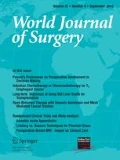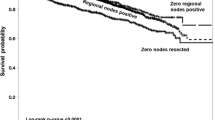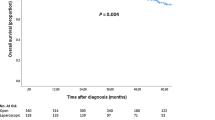Abstract
Background
Neuroendocrine tumors of the small intestine commonly metastasize to regional lymph nodes (LNs). Single-institution reports suggest that removal of LNs improves outcome, but comprehensive data are lacking. We hypothesized that the extent of lymphadenectomy reported in a large administrative database would be associated with overall survival for jejunal and ileal neuroendocrine tumors.
Methods
A search of the Surveillance Epidemiology and End Results database was performed for patients with jejunal and ileal neuroendocrine tumors from 1977 to 2004. Descriptive patient characteristics were collected to include age at diagnosis, sex, race, grade, primary tumor size, LN status, number of LNs resected, presence of distant metastasis, and the type of operation. Statistical analyses were limited to patients with only one primary tumor to exclude patients with other malignancies. Univariate and multivariate analyses were performed to analyze the number of LNs resected and the LN ratio (number of positive LNs/total number of LNs removed) to determine the effect on cancer-specific survival.
Results
Altogether, 1,364 patients were included in this analysis. Removal of any LNs was associated with improved cancer-specific survival when compared to patients with no LN removal reported (p = 0.0027) on univariate analysis. Among those who had any LNs removed, a median of eight LNs were identified in resection specimens with a median LN ratio of 0.29 (range 0–1). On multivariate analysis (adjusting for age and tumor size), patients with >7 LNs removed experienced better cancer-specific survival than those with ≤7 LNs removed (median survival not reached vs. 140 months): hazard ratio and 95 % confidence interval were 0.573 (0.402, 0.817) (p = 0.002).
Conclusions
This review of a large number of surgical patients demonstrates that regional mesenteric lymphadenectomy in conjunction with resection of the primary tumor is associated with improved survival of patients with small bowel neuroendocrine tumors.



Similar content being viewed by others
References
Bilimoria KY, Bentrem DJ, Wayne JD et al (2009) Small bowel cancer in the United States: changes in epidemiology, treatment, and survival over the last 20 years. Ann Surg 249:63–71
Anonymous (2010) AJCC cancer staging handbook, 7th edn. American Joint Committee on Cancer, Chicago
Yao JC, Hassan M, Phan A et al (2008) One hundred years after “carcinoid”: epidemiology of and prognostic factors for neuroendocrine tumors in 35,825 cases in the United States. J Clin Oncol 26:3063–3072
Hellman P, Lundstrom T, Ohrvall U et al (2002) Effect of surgery on the outcome of midgut carcinoid disease with lymph node and liver metastases. World J Surg 26:991–997. doi:10.1007/s00268-002-6630-z
Martin RG (1970) Management of carcinoid tumors. Cancer 26:547–551
Morgan JG, Marks C, Hearn D (1974) Carcinoid tumors of the gastrointestinal tract. Ann Surg 180:720–727
Landerholm K, Zar N, Andersson RE et al (2011) Survival and prognostic factors in patients with small bowel carcinoid tumour. Br J Surg 98:1617–1624
Kerstrom G, Hellman P, Hessman O (2005) Midgut carcinoid tumours: surgical treatment and prognosis. Best Pract Res Clin Gastroenterol 19:717–728
Pavel ME, Hainsworth JD, Baudin E et al (2011) Everolimus plus octreotide long-acting repeatable for the treatment of advanced neuroendocrine tumours associated with carcinoid syndrome (RADIANT-2): a randomised, placebo-controlled, phase 3 study. Lancet 378:2005–2012
Yao JC, Phan AT, Chang DZ et al (2008) Efficacy of RAD001 (everolimus) and octreotide LAR in advanced low- to intermediate-grade neuroendocrine tumors: results of a phase II study. J Clin Oncol 26:4311–4318
Acknowledgments
This study was supported by the Khalifa Bin Zayed Al Nahyan Foundation, various donors to the Pancreatic Research Fund at MD Anderson Cancer Center, and the National Institutes of Health through MD Anderson’s Cancer Center Support Grant CA016672.
Author information
Authors and Affiliations
Corresponding authors
Rights and permissions
About this article
Cite this article
Landry, C.S., Lin, H.Y., Phan, A. et al. Resection of At-Risk Mesenteric Lymph Nodes Is Associated with Improved Survival in Patients with Small Bowel Neuroendocrine Tumors. World J Surg 37, 1695–1700 (2013). https://doi.org/10.1007/s00268-013-1918-8
Published:
Issue Date:
DOI: https://doi.org/10.1007/s00268-013-1918-8




